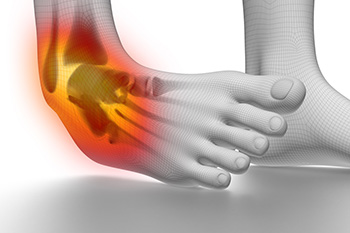
Pregnancy can have a significant impact on the feet, ankles, and toes due to both physical and hormonal changes. As body weight increases, the added pressure shifts the center of gravity forward, placing extra strain on the feet and ankles. This can cause discomfort and contribute to swelling, often making it difficult to find properly fitting shoes. In the later stages of pregnancy, the hormone relaxin causes ligaments in the feet to loosen, which may lead to flattening of the arches, lengthening of the feet, and broadening of the forefoot. These structural changes can sometimes remain permanent, leading to ongoing issues like pain or difficulty with balance. Reduced physical activity and swelling can further aggravate foot fatigue, particularly in the third trimester. A podiatrist can assess these changes, address sources of discomfort, and provide treatment to help improve foot health. If you are experiencing foot problems during pregnancy, it is suggested that you schedule an appointment with a podiatrist to help increase comfort and mobility.
Pregnant women with swollen feet can be treated with a variety of different methods that are readily available. For more information about other cures for swollen feet during pregnancy, consult with one of our podiatrists from Florida Ankle & Foot Institute. Our doctors will attend to all of your foot and ankle needs.
What Foot Problems Can Arise During Pregnancy?
One problem that can occur is overpronation, which occurs when the arch of the foot flattens and tends to roll inward. This can cause pain and discomfort in your heels while you’re walking or even just standing up, trying to support your baby.
Another problem is edema, or swelling in the extremities. This often affects the feet during pregnancy but tends to occur in the later stages.
How Can I Keep My Feet Healthy During Pregnancy?
- Wearing orthotics can provide extra support for the feet and help distribute weight evenly
- Minimize the amount of time spent walking barefoot
- Wear shoes with good arch support
- Wear shoes that allow for good circulation to the feet
- Elevate feet if you experience swelling
- Massage your feet
- Get regular, light exercise, such as walking, to promote blood circulation to the feet
If you have any questions, please feel free to contact our offices located in Tavernier, Marathon, and Key West, FL . We offer the newest diagnostic and treatment technologies for all your foot care needs.

An ankle sprain is an injury that occurs when the ligaments supporting the ankle stretch or tear, often causing pain, swelling, and difficulty walking. Common causes include twisting the ankle during sports, stepping on uneven surfaces, or sudden impact. Risk factors include previous ankle injuries, weak muscles, wearing improper footwear, and participation in high-impact activities. Symptoms may involve bruising, instability, stiffness, or a popping sensation at the time of injury. A podiatrist can evaluate the severity of the sprain, provide treatment such as bracing and exercises to restore strength and prevent recurrence. If you have sprained your ankle, it is suggested that you consult a podiatrist who can accurately diagnose and treat this condition.
Although ankle sprains are common, they aren’t always minor injuries. If you need your ankle injury looked at, contact one of our podiatrists from Florida Ankle & Foot Institute. Our doctors can provide the care you need to keep you pain-free and on your feet.
How Does an Ankle Sprain Occur?
Ankle sprains are the result of a tear in the ligaments within the ankle. These injuries may happen when you make a rapid shifting movement while your foot is planted. A less common way to sprain your ankle is when your ankle rolls inward while your foot turns outward.
What Are the Symptoms?
- Pain at the sight of the tear
- Bruising/Swelling
- Ankle area is tender to touch
- In severe cases, may hear/feel something tear
- Skin discoloration
Preventing a Sprain
- Wearing appropriate shoes for the occasion
- Stretching before exercises and sports
- Knowing your limits
Treatment of a Sprain
In many cases, the RICE method (Rest, Ice, Compression, and Elevate) is used to treat ankle sprains. However, you should see a podiatrist to see which treatment option would work best with your injury. In severe cases, surgery may be required.
It is important to ask your doctor about rehab options after you receive treatment for your injury. Stretching, strength training, and balance exercises may help the ankle heal while also preventing further injury.
If you have any questions, please feel free to contact our offices located in Tavernier, Marathon, and Key West, FL . We offer the newest diagnostic and treatment technologies for all your foot care needs.
 Heel pain is one of the most common reasons patients visit a podiatrist. Common causes of heel pain include plantar fasciitis, Achilles tendonitis, bursitis, heel spurs, or a stress fracture. While all of these injuries are different, there are a few signs to look for to determine whether or not consulting with a podiatrist is necessary. Immediate treatment will be needed if there is severe pain or swelling, loss of mobility in the foot, inability to bear weight, or redness. Other symptoms that will require care from a podiatrist include pain that lasts more than two weeks, pain that is getting worse, and heel pain that persists even when you are not walking or standing. If you have any of the above heel pain symptoms, it is suggested that you make an appointment with podiatrist for a proper diagnosis and treatment plan.
Heel pain is one of the most common reasons patients visit a podiatrist. Common causes of heel pain include plantar fasciitis, Achilles tendonitis, bursitis, heel spurs, or a stress fracture. While all of these injuries are different, there are a few signs to look for to determine whether or not consulting with a podiatrist is necessary. Immediate treatment will be needed if there is severe pain or swelling, loss of mobility in the foot, inability to bear weight, or redness. Other symptoms that will require care from a podiatrist include pain that lasts more than two weeks, pain that is getting worse, and heel pain that persists even when you are not walking or standing. If you have any of the above heel pain symptoms, it is suggested that you make an appointment with podiatrist for a proper diagnosis and treatment plan.
Many people suffer from bouts of heel pain. For more information, contact one of our podiatrists of Florida Ankle & Foot Institute. Our doctors can provide the care you need to keep you pain-free and on your feet.
Causes of Heel Pain
Heel pain is often associated with plantar fasciitis. The plantar fascia is a band of tissues that extends along the bottom of the foot. A rip or tear in this ligament can cause inflammation of the tissue.
Achilles tendonitis is another cause of heel pain. Inflammation of the Achilles tendon will cause pain from fractures and muscle tearing. Lack of flexibility is also another symptom.
Heel spurs are another cause of pain. When the tissues of the plantar fascia undergo a great deal of stress, it can lead to ligament separation from the heel bone, causing heel spurs.
Why Might Heel Pain Occur?
- Wearing ill-fitting shoes
- Wearing non-supportive shoes
- Weight change
- Excessive running
Treatments
Heel pain should be treated as soon as possible for immediate results. Keeping your feet in a stress-free environment will help. If you suffer from Achilles tendonitis or plantar fasciitis, applying ice will reduce the swelling. Stretching before an exercise like running will help the muscles. Using all these tips will help make heel pain a condition of the past.
If you have any questions, please feel free to contact our offices located in Tavernier, Marathon, and Key West, FL . We offer the newest diagnostic and treatment technologies for all your foot care needs.




